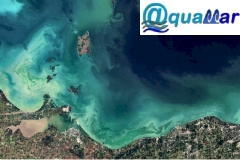Water quality (WQ) is a focus of monitoring agencies and the public and it is subject of several European Directives and regional conventions.
WQ refers to the physical, chemical and biological characteristics of water. It is a measure of the state/condition of a water basin relative to certain requirements and is most frequently used with reference to a set of standards against which compliance can be assessed.
Some European policy directives and international conventions actually set common rules for all the member states, such as: EC Water Framework Directive (WFD) (2000); Marine Strategy Directive - (EMS) (2008); EU Integrated Coastal Zone Management (ICZM) Recommendations (2002); and others.
In order to be effective, the implementation of such legislations needs to be rigorously monitored. In this respect, and in the context of the European Copernicus programme (former GMES - Global Monitoring for Environment and Security initiative), water quality services are paramount.
The most accurate measurements of WQ are made on site; more complex measurements are often made in a laboratory using water samples. However on-site measurements present the disadvantage of a limited temporal and spatial view of a sea area and of high operative costs. WQ measurements from Earth Observation (EO) can provide valid support to and complement on-site data.
At the European level, the Copernicus Marine Core Service (MCS) provides basic products also concerning WQ, which however need further added value to meet the institutional European and national end user requirements.
AquaMar, an FP7 research project (2009-2013), had the objective to improving existing services and develop new products for supporting users' reporting duties at European level, further matching their requirements. A parallel key objective was to bring benefits to the European citizens: e.g. on all European beaches, the blue flag that signals good quality of bathing water comforts families. Securing water quality is a key European priority and AquaMar developed products aimed in helping to monitor this quality. Beyond health benefits, AquaMar aimed in bringing economical added value by providing valuable information for aquaculture or infrastructure impact in the coastal environment.
The AquaMar project developed downstream services transforming MCS products into WQ services, demanded by end user. The research and development (R&D) activities focused on five innovative lines of services allowing to bring EO applications to novel sectors or to strengthen their use:
- Support to EU Water Framework Directive and European Marine Strategy
- Harmful Algal Blooms (HAB) detection
- Support for assessment and monitoring of large scale marine coastal infrastructure projects
- Quality of bathing water, supporting the EU Bathing Water Directive
- Support to aquaculture precision farming
Until the end of the project, such innovative products have been implemented and tested within real use-cases with the involvement of end users (in some cases novel services were integrated into MarCoast).
The heritage of the AquaMar (and MarCoast) project consists on the one hand with the creation of a strong community of downstream service providers and users in the WQ domain within Europe and from the other hand a knowledge of the critical issues, technological and economical, to reach the implementation of operational and self-sustaining services. Currently new projects are on-going or to be started to keep high the user community involvement, to continue R&D activities and to be ready to take profit of the Copernicus Sentinel satellites family.
Download and read also the PDF Article from the GeoXperience Magazine






